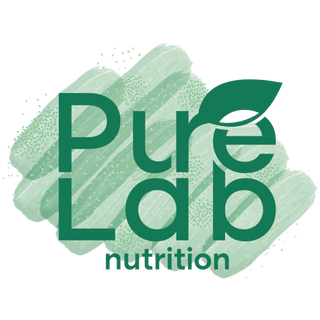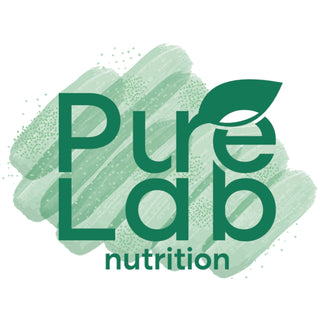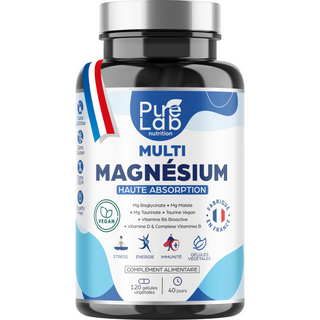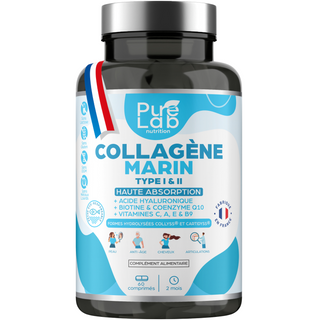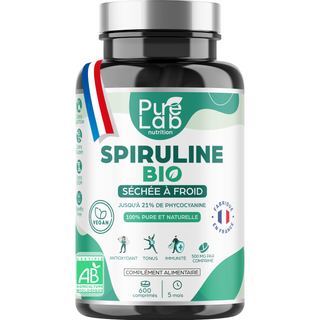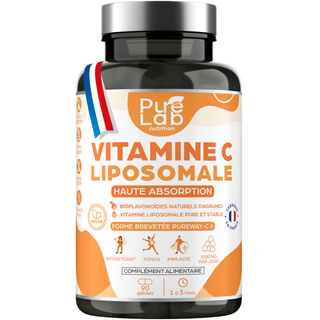Do dietary supplement labels seem indecipherable to you? Bioavailability, excipients, dosage form... These technical terms turn a simple wellness purchase into an obstacle course.
At Pure Lab Nutrition, we believe that understanding what you consume is a fundamental right. That's why we've created this handy glossary: clear, jargon-free definitions to help you become an informed consumer.
Turn your next label reading into a moment of confidence!
Absorption
It is the passage of nutrients from your intestine to your blood to then be distributed throughout your body.
Not all nutrients are absorbed in the same way or with the same efficiency. For example, standard vitamin C is only about 25% absorbed. Therefore, the form and timing of your supplements are crucial to their effectiveness, sometimes improving nutrient absorption.
Amino Acids
The "building blocks" that make up proteins. Your body needs them to build and repair your muscles, skin, hair, and more.
There are 2 types:
- Essentials : your body cannot produce them, you must obtain them through food or supplements
- Non-essential : your body can produce them on its own
Additives
Substances added to supplements to improve their appearance, taste, or preservation. They have no nutritional effect.
The main ones:
- Dyes : for color
- Sweeteners : for sweet taste without sugar
- Anti-caking agents : prevent the powder from clumping
- Preservatives : extend shelf life
- Coating agents : for the capsule shell
Our Pure Lab Nutrition advice: Choose supplements with the minimum of necessary additives.
Charge Agent
Ingredient added to give volume when the dose of active ingredient is very small. Like flour in a cake!
The most common: maltodextrin, microcrystalline cellulose, calcium phosphate.
At Pure Lab Nutrition, we prefer natural alternatives like acacia fiber or rice starch, which are better tolerated by your body.
Allergens
Substances that can trigger allergic reactions in some people.
The most common in supplements:
- Gluten (wheat, barley, oats)
- Lactose (dairy products)
- Soy
- Nuts
- Fish (for omega-3)
Important: These allergens must be listed in bold on the label.
Reference Intakes (RI)
The European Union officially recommends the daily intake of vitamins and minerals . These are used as a basis for calculating the percentages on labels.
Example: If you see "100% RI" for vitamin C, that corresponds to 80mg.
Bioavailability
The amount of active ingredient that actually reaches your blood and can act in your body.
The higher the bioavailability, the more effective the supplement. That's why we always choose the best-absorbed forms: magnesium bisglycinate over magnesium oxide, vitamin B12 methylcobalamin over cyanocobalamin.
Capsule
Soft shell containing liquid or oily active ingredients. Perfect for fat-soluble vitamins (A, D, E, K) and oils (omega-3, coenzyme Q10).
The shell is usually made of animal gelatin (bovine, porcine, or marine). At Pure Lab Nutrition, we avoid bovine and porcine sources at all costs, and only use (for softgel-based food supplements (e.g., omega-3) shells of marine or vegan origin.
Food Supplements
Products designed to supplement your normal diet by providing a concentrated source of nutrients: vitamins, minerals, plants, amino acids, etc.
They come in different forms: capsules, tablets, powders, liquids. Important: They do not replace a balanced diet, they complement it.
Compressed
A solid form obtained by compressing powder. Like a pill, but with nutrients.
Advantages: precise dosage, good preservation, easy to transport.
Excipient
A non-nutrient-based ingredient that helps make the supplement. It facilitates the production, preservation, or absorption of the active ingredient.
Examples: the capsule shell, the anti-caking agent that prevents the powder from sticking...
Our philosophy: A good supplement contains more active ingredients than excipients.
Plant Extract
Substance obtained by isolating the active part of a plant (roots, leaves, fruits, etc.) using different processes.
An extract is said to be "titrated" when its exact concentration of active ingredient is known. The more titrated it is, the more effective and reliable it is.
Galenic form
The form in which your supplement comes: capsule, tablet, powder, liquid, etc.
Each form has its benefits depending on the type of nutrient and your personal preferences.
Capsule
Hard shell that contains the powdered active ingredients. Easier to swallow than a tablet for many people.
There are two types:
- Plant-based (HPMC): suitable for vegetarians/vegans
- In animal gelatin : cheaper but of animal origin
At Pure Lab Nutrition, we favor vegetable capsules to comply with all dietary requirements.
Made in France
A statement indicating that the product was manufactured in France. For supplements, this guarantees compliance with strict European standards.
Please note: Ingredients may sometimes come from elsewhere, but final assembly and checks are systematically carried out in France.
Minerals
Elements that come from the earth and are essential for your body. Calcium for bones, iron for blood, zinc for immunity...
Examples: magnesium, zinc, calcium, iron, selenium.
They are present in small quantities in your body but play essential roles.
Nutraceutical
Product made from food ingredients but presented in supplement form (capsules, tablets, etc.).
It provides health benefits beyond just basic nutrition.
GMO
Genetically Modified Organism: a living being whose genetic heritage has been modified by humans to obtain new characteristics.
“GMO-free” guarantees natural, non-genetically modified ingredients.
Active ingredient
The ingredient that delivers the desired effect. It's the one that works for your well-being!
In a turmeric supplement, the active ingredient is curcumin. In a multivitamin, it is all the vitamins and minerals.
Titration
Precise measurement of the concentration of active ingredient in a plant extract or supplement.
The higher and more precise the titration, the more certain you are of the product's effectiveness.
UI (International Unit)
Unit of measurement used for certain vitamins such as vitamin D or E.
Conversion examples:
- 1000 IU of vitamin D = 25 μg
- 100 IU of vitamin E = 67 mg
Vegan
No animal-derived ingredients. No gelatin, no lactose, no animal magnesium stearate...
Suitable for vegetarians, vegans and people avoiding animal products for religious reasons.
Vitamins
Organic substances essential to the proper functioning of your body that your body cannot produce (or not enough of).
There are 13 essential ones, classified into 2 groups:
- Water-soluble (dissolve in water): vitamins B and C
- Fat-soluble (dissolve in fats): vitamins A, D, E, K
Your Pure Lab Nutrition Buying Guide
Now that you have mastered the vocabulary, here are our tips for choosing well:
✅ Read the list of ingredients: choose more active ingredients than excipients
✅ Check the forms: magnesium bisglycinate > magnesium oxide
✅ Look for titrations: titrated plant extracts = guaranteed effectiveness
✅ Check the origin: "Made in France" = strict standards
✅ Avoid unnecessary additives: unnecessary artificial colors and flavors
Our Pure Lab Nutrition commitment: Transparent formulas, premium ingredients, and excellent French manufacturing.
Now you know how to decipher any label! No more blind shopping, just make informed choices for your well-being.
Pure Lab Nutrition... The art of nourishing your well-being!

